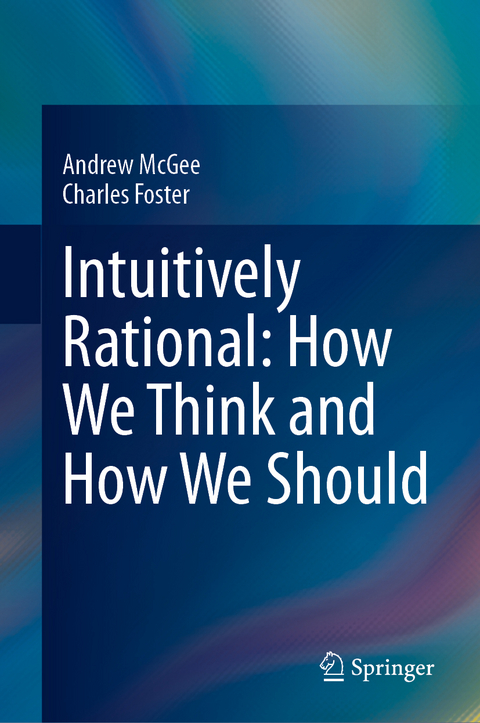
Intuitively Rational: How We Think and How We Should
Springer International Publishing (Verlag)
978-3-031-49714-8 (ISBN)
This book is about the respective roles of intuition and reasoning in ethics. It responds to a number of well-known philosophers and psychologists, and proposes a new perspective - radical in its moderation. It examines in depth the work of the philosopher Joshua Greene and the psychologist Jonathan Haidt. With the so-called empirical turn in ethics, much work has been done to try to isolate the role of reason and intuition in forming our moral judgements, with Haidt and Greene leading the research programmes and attracting much of the professional and public attention, and many others following. The current view - shared by both camps - is that intuition is largely the driver of our moral judgements - a view summed up in Haidt's slogan 'intuition first, strategic reasoning second'. Haidt believes we have to live with this and accept it. Greene does not: he contends that our intuitions, while suitable for the environments in which we evolved, are worthless in the modern, global, technological age, and to avoid ethical disaster we must learn to adopt reason as the arbiter of moral truth. This book steers a middle course between these two positions and is therefore of great interest to philosophers and psychologists alike.
Intuition and reason, and different conceptions of them, lie behind many significant discussions in recent philosophical ethics and moral psychology. One effect of those discussions has been the insertion of a wedge between the two notions. In this engaging and fascinating book, McGee and Foster make a thought-provoking case for removing that wedge. - Professor Roger Crisp, Professor of Moral Philosophy, University of Oxford
I wanted to cheer all the way through this beautifully written book - one that is both incisive and profoundly humane. So much moral philosophy is ensnared in simple rationalism or simple intuitionism: this book argues that intuition and reason are not just at times compatible, in a sort of uneasy compromise, but that each is always essential to the proper functioning of the other. Its takedown of so much utilitarianism is long overdue. It embraces what can be learnt from neuroscience and at the same time appeals to morality in the practice of life, not just in the seminar room. A book that should be on every intelligent reader's shelves. - Dr Iain McGilchrist, author of The Master and His Emissary and The Matter with Things
What is the role of reason and intuition in ethics? This spirited and thought[1]provoking book makes the case that the relationship between reason and intuition has been fundamentally mischaracterized. And beware-there is a degree of pain in store for those of us who've relied on (and enjoyed) elaborate philosophical thought experiments, such as the famous trolley problem. They're next to useless, the authors contend, in providing us with any genuine moral insight. - David Edmonds, author of Would You Kill the Fat Man?
lt;p>Charles Foster is a Fellow of Exeter College, University of Oxford, a Senior Research Associate at the Uehiro Institute of Practical Ethics within the Faculty of Philosophy at the University of Oxford, and a Visiting Professor at the Oxford University Law Faculty.He too has published widely in leading philosophy and law journals. Previous books include, amongst many others, Being a Human (Profile and Henry Holt, 2021), The Law as a Moral Agent: Making people good (Springer, 2021, with Jonathan Herring), Human Thriving and the Law (Springer, 2018, with Jonathan Herring), Identity, Personhood and the Law (Springer, 2017, with Jonathan Herring), Being a Beast (Profile and Henry Holt, 2016), Altruism, Welfare and the Law (Springer, 2015, with Jonathan Herring), Human dignity in bioethics and law (Hart, 2012), Choosing Life, Choosing Death: The tyranny of autonomy in medical law and ethics (Hart, 2009), and The Selfless Gene (Hodder, 2008).
Andrew McGee is Associate Professor in law at Queensland University of Technology. He holds a PhD in philosophy from the University of Essex. Before joining QUT, he completed a post-doctoral research fellowship in philosophy at University College Dublin. His main research interests are in the realm of bioethics. He has published widely on ethical issues in leading peer reviewed philosophy and ethics journals including Metaphilosophy, Philosophy, Psychiatry & Psychology, Journal of Medicine and Philosophy, and the Journal of Medical Ethics.
Chapter 1. Introduction: the Agony of Corinne Rey.- Chapter 2. Beginnings.- Chapter 3. Neuroscience and judgement.- Chapter 4. Taking the evolutionary psychological elephant by the tusks.- Chapter 5. Moral truth.- Chapter 6. Can our moral beliefs be debunked?.- Chapter 7. Selfish genes and morality.- Chapter 8. Joshua Greene's empirical challenge to deontology.- Chapter 9. Limits of trolley-problem-style thought experiments.- Chapter 10. Realistic trolleyology?.- Chapter 11. Steering a course between intuitionism and austere rationalism.- Chapter 12. Conclusion.
| Erscheinungsdatum | 10.04.2024 |
|---|---|
| Zusatzinfo | XIII, 215 p. 5 illus. |
| Verlagsort | Cham |
| Sprache | englisch |
| Maße | 155 x 235 mm |
| Themenwelt | Geisteswissenschaften ► Philosophie ► Allgemeines / Lexika |
| Geisteswissenschaften ► Philosophie ► Erkenntnistheorie / Wissenschaftstheorie | |
| Geisteswissenschaften ► Philosophie ► Ethik | |
| Schlagworte | Joshua Greene • Realistic trolleyology • Street's Darwinian Dilemma • Street’s Darwinian Dilemma • the Euthyphro Dilemma • the trolley dilemma • trolley-problem-style thought experiments • Utilitarianism and objectivity in morality |
| ISBN-10 | 3-031-49714-7 / 3031497147 |
| ISBN-13 | 978-3-031-49714-8 / 9783031497148 |
| Zustand | Neuware |
| Haben Sie eine Frage zum Produkt? |
aus dem Bereich


